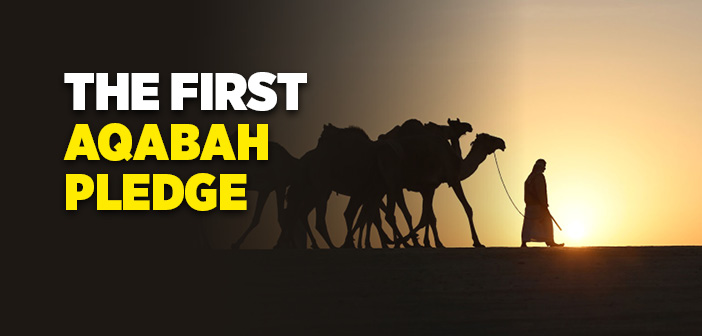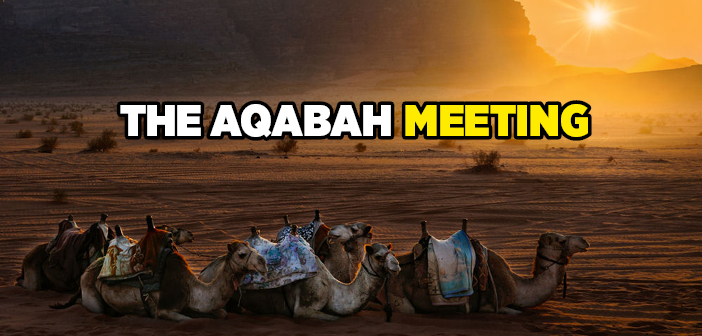Prophet Muhammad’s migration from Mecca to Medina
The Prophet’s Last Resort: Migration
After finding out about Muslim plans to migrate to where they would find protection following the Second Aqabah Pledge, the idolaters took their abuse to new heights. With this unbearable torment making life almost impossible for Muslims in Mecca, the believers asked permission of the Prophet -upon him blessings and peace- to migrate.
By the will of the Almighty, the Messenger of Allah -upon him blessings and peace- pointed towards the road to Medina and said:
“I have been shown that your destination shall be a place of date gardens wedged amid rocky terrain”. (Bukhari, Kafalah, 4)
Advising them to embrace the Ansar, their brothers in Medina, the Prophet -upon him blessings and peace- then added:
“The Glorious Allah has blessed you with brothers and a land where you shall find peace!”
Without making it obvious to the idolaters, the Muslims thereupon got their preparations under way, and aiding one another, began migrating in secret.[1]
Even though the Believers were generously welcomed in Abyssinia, the first destination of Muslim migration, the region did not meet the requirements for being a center for a universal religion. But Medina, both politically and commercially, was a town favorable to being an Islamic center. Thus, it was there the Hegira would take place.
Indeed Medina became a shelter for the Believers. The worst fears of the Meccan idolaters were hence confirmed; Islam had set forth from Mecca to Medina, where it had gained an enormous reputation. The idolaters simply could not come to terms with how terrible a loss the forcible departure of the Prophet -upon him blessings and peace- from his hometown was for them. It was truly a great loss. But they could not even feel it, let alone see the consequences.
And the Almighty revealed to His Prophet upon him blessings and peace:
“…they will not stay therein after you, except for a little while.” (al-Isra, 76)
Deceived by their seeming power and ego, the idolaters had fooled themselves into believing that mocking, threatening and torturing the Believers would deter them from the Truth, and enable to keep themselves in authority in Mecca. Little were they aware of what was lying in wait for them: an absolute and miserable defeat without return. After all, the Muslims were not leaving Mecca out of fear, but from the awareness of the need to found Islam upon the strongest foundations.
The Hegira should never be taken as a helpless and pitiable flight. For the Muhajir, the Emigrants, Medina was a haven, a headquarters in which they settled to render sovereign the religion of the Almighty, by joining forces with other Muslim brothers and sisters.
The late Necip Fazıl gives voice to this in the poem below:
Hegira…the support that is sought from afar,
For a man of mission, the home is a fetter,
The hope… from outside to envelop the core,
The will to conquer the center from abroad…
Hegira…The support that is sought from afar!
The Emigrants were leaving behind all they had of wealth and relatives, secretly or openly setting forth on the road to Medina.
Ali –Allah be well-pleased with him- gives the following account:
“I know of nobody who openly migrated to Medina. Omar ibn Khattab was an exception. Prior to leaving, he armed himself with his sword, hung his bow on his shoulder and with his spear and arrows in his hands went to the Kaabah. All the Meccan notables were there. Omar –Allah be well-pleased with him- circumambulated the Kaabah seven times and then went next to them, and as if to give a glimpse of the victories to come, declared:
‘Here you have it! I am leaving for Medina. Whoever wants to leave behind a weeping mother, a widow and orphans can follow me and face me off behind the valley!’
Nobody dared take up the challenge.” (Ibn Athir, Usd’ul-Ghabah, IV, 152-153)
The Medinans were welcoming their brothers with open arms and helping them from the bottom of their hearts. The Muslims of Mecca were thus dubbed Muhajir, meaning emigrants, and the Medinan Muslims Ansar, or helpers.
The Almighty states:
“And the first to lead the way, of the Muhajir and the Ansar, and those who followed them in goodness – Allah is well pleased with them and they are well pleased with Him, and He has made ready for them Gardens underneath which rivers flow, wherein they will abide for ever. That is the supreme triumph.” (at-Tawba, 100)
Scholars have derived the following conclusions from the permission given to Muslims to migrate:
Hegira was compulsory in the time of the time of the Noble Prophet -upon him blessings and peace-. Generally perceived, there is a compulsoriness of Hegira that will remain till the Day of Judgment. But the particular Hegira that ended with the conquest of Mecca, however, is peculiar to the time of the Prophet -upon him blessings and peace-.
It is impermissible for a Muslim to remain in a place where he cannot fulfill duties like the adhaan, salat in congregation and fasting. The ayah below is proof:
“Surely (as for) those whom the angels cause to die while they are unjust to their souls, they shall say: In what state were you? They shall say: We were weak on Earth. They shall say: Was not Allah’s earth spacious, so that you should have migrated therein? So it is these whose abode is hell, an evil resort. Except the weak from among the men and the children who neither have in their power the means, nor can they find a way to escape.” (an-Nisa, 97-98)
The above ayah describes those who did not migrate and continued to remain in a society of unbelievers, as being unjust to their souls. For preferring their comfort, habits, families, wealth and vested interests over their Religion, their excuse of being among the ‘weak on Earth’ is not accepted in the Divine tribunal. The excuse is valid only for the elderly, invalids, and women and children who genuinely could not find the means to join the Hegira.
Another matter the Hegira teaches us is that no matter how distant Muslim lands may be from one another, it is obligatory to help those afflicted with oppression. So far as the ijma, or consensual opinion of Muslim scholars are concerned, Muslims who, despite having the power to do so, fail to help other Muslims oppressed in any given part of the world, partake in a major sin.
The Light of Being -upon him blessings and peace- placed great importance on the Hegira and urged all Muslims to take part until the Conquest of Mecca. This was mainly because until then, all lands besides Medina were foreign, making it practically impossible for a believer to learn and practice his beliefs.
[1] See Ibn Hisham, II, 76; Ibn Saad, I, 226.
Source: Osman Nuri Topbaş, The Prophet Muhammed Mustafa the Elect, Erkam Publications
SIMILAR ARTICLES
- WHAT IS ISLAM?
- THE FAMILY TREE OF PROPHET MUHAMMAD SAW
- THE FIRST AQABAH PLEDGE
- FREE ISLAMIC BOOKS READ AND DOWNLOAD PDF
- THE AQABAH MEETING





